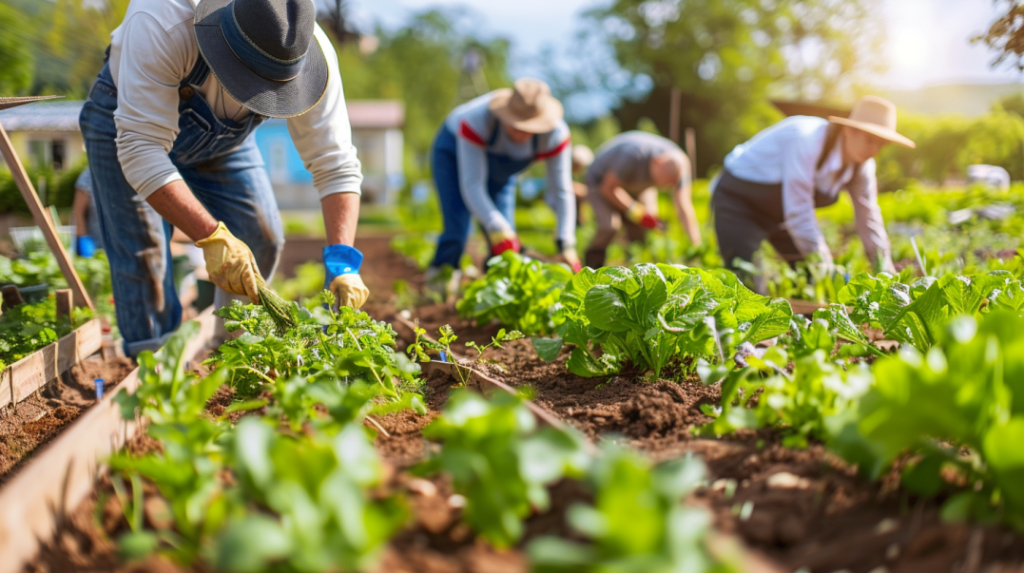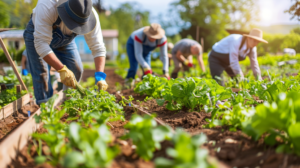Introduction
In the hustle and bustle of modern urban life, finding ways to foster community spirit and bring people together is increasingly important. Community gardening and urban farming have emerged as powerful tools for unity, transforming cities into vibrant, collaborative, and sustainable environments. These initiatives go beyond just growing food; they cultivate social bonds, enhance local economies, and promote environmental stewardship. Let’s delve into how community gardening and urban farming are uniting people and transforming urban landscapes.
Growing Connections
Building Relationships
Community gardens and urban farms create spaces where people of all ages, backgrounds, and cultures can come together. These green spaces become hubs of social interaction, where neighbors who might otherwise never meet can connect and collaborate. The shared goal of cultivating a garden fosters a sense of camaraderie and cooperation, breaking down social barriers and fostering mutual respect.
Intergenerational Learning
One of the unique aspects of community gardening is the opportunity for intergenerational learning. Older adults with gardening experience can share their knowledge with younger generations, passing down valuable skills and traditions. This exchange not only preserves cultural heritage but also builds strong relationships between different age groups, promoting a sense of continuity and community resilience.
An excellent example of this is the Edible Schoolyard Project in Berkeley, California. This initiative integrates gardening into the school curriculum, allowing students to learn about sustainable agriculture and nutrition while interacting with older volunteers and community members.
Enhancing Local Economies
Job Creation and Skill Development
Urban farming initiatives often create job opportunities and provide training in sustainable agriculture, horticulture, and food production. These projects can offer employment to marginalized groups, including youth, immigrants, and low-income individuals, empowering them with new skills and improving their economic prospects. By investing in local talent, urban farms help build a more resilient and inclusive economy.
Supporting Local Businesses
Community gardens and urban farms can also support local businesses by supplying fresh, locally-grown produce. Farmers’ markets and farm-to-table restaurants benefit from having access to high-quality, seasonal ingredients, which in turn attracts customers who value sustainability and locally-sourced food. This symbiotic relationship strengthens the local economy and fosters a sense of pride in the community’s agricultural achievements. Detroit’s Eastern Market is a prime example. This historic market has become a thriving center for local food production and distribution, supporting urban farmers and connecting them with local consumers and businesses.
Promoting Environmental Stewardship
Sustainable Practices
Urban farming encourages the adoption of sustainable practices, such as composting, water conservation, and organic farming. These practices reduce the environmental footprint of food production and promote healthier ecosystems. Community gardeners often become advocates for environmental sustainability, spreading awareness and inspiring others to adopt eco-friendly habits.
Green Spaces and Urban Biodiversity
Community gardens and urban farms contribute to the greening of cities, creating pockets of biodiversity amidst concrete jungles. These green spaces provide habitats for pollinators, birds, and other wildlife, enhancing urban biodiversity. Additionally, they improve air quality, reduce the urban heat island effect, and offer residents a respite from the stress of city life. In New York City, Brooklyn Grange operates the world’s largest rooftop soil farms. These farms produce a significant amount of vegetables while promoting biodiversity and providing green spaces in an urban setting.
Fostering Food Security
Access to Fresh Produce
In many urban areas, access to fresh, affordable produce can be limited. Community gardens and urban farms address this issue by providing a local source of nutritious food. By growing their own vegetables and fruits, residents can improve their diets and reduce their dependence on expensive, store-bought produce. This access to fresh food is particularly important in food deserts, where healthy options are scarce.
Empowering Communities
By taking control of their food production, communities become more self-sufficient and resilient. Urban farming empowers residents to take an active role in their food systems, promoting food sovereignty and reducing vulnerability to supply chain disruptions. This sense of empowerment can foster community pride and encourage further collective action. The South Central Farm in Los Angeles serves as a notable example. This community garden provided fresh produce and a sense of empowerment to its residents, many of whom were low-income immigrants, demonstrating the powerful impact of local food production on community wellbeing.
Conclusion
Community gardening and urban farming are much more than hobbies or trends; they are powerful tools for unity and transformation. By bringing people together, enhancing local economies, promoting environmental stewardship, and fostering food security, these initiatives are creating stronger, more connected, and sustainable urban communities. As cities continue to grow and face new challenges, the role of community gardens and urban farms will be increasingly vital in cultivating a brighter, more inclusive future.


